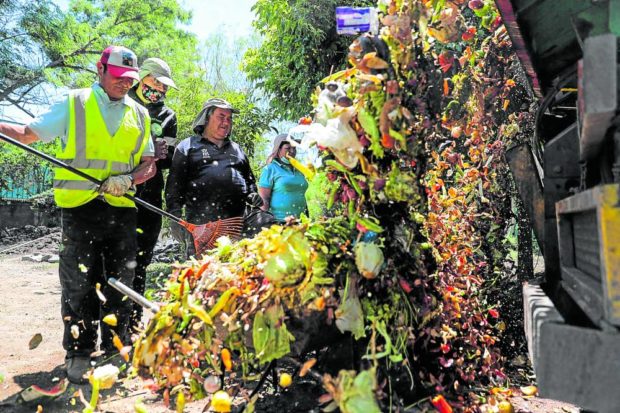Food recycling turns poorest district green

‘NO LONGER PUT WITH THE GARBAGE’ | Municipal staff collect organic material which will be sent for a recycling process in the commune of La Pintana in Santiago, Chile. (Agence France-Presse)
SANTIAGO — Every morning, trucks collect potato and avocado skins, orange peels, and other food scraps that residents of the poorest neighborhood in this Chilean capital leave hanging in bags on their front doors or in tree branches or place in special bins.
For nearly two decades, residents of La Pintana have been pioneers of recycling in Chile — South America’s largest garbage generator.
Under a project started in 2005, the commune of 190,000 people enthusiastically gather their plant-based food waste, which is then turned into compost to help green their community.
In La Pintana, where 15 percent of people live in poverty, 50 percent of the community’s organic waste is collected for recycling—a figure that puts to shame the 0.8 percent achieved by Chile as a whole, according to environment ministry data.
“They do a lot with it [the waste]: they produce compost and it is used for the community itself, for the squares and gardens,” La Pintana resident Jose Vera told Agence France-Presse (AFP) as he left two large cardboard boxes filled with scraps on the sidewalk, proud of his contribution.
Article continues after this advertisementIt is also a saving for the municipality because they no longer have to buy fertilizer or pay landfill fees, he said.
Article continues after this advertisement‘A change in people’
Chile generates some 1.13 kilograms of waste per person per day—the highest output in South America, according to World Bank data.
In terms of recycling, it is far from achieving even Latin America’s low average of 4 percent of solid municipal waste processed.
But La Pintana, one of the first neighborhoods of Chile’s deeply socially unequal capital to adopt such a project, now collects some 20 tons of organic waste every day.
It is delivered to a local plant that turns the scraps into natural fertilizer for the town’s own nursery, and others.
The municipality estimates to be saving some $100,000 per year—money that can go to other community projects.
“There has been a change in people” since the project started, Vera said. “They are now concerned about recycling and no longer put the vegetables with the garbage.”
‘Virtuous circle’
La Pintana’s nursery, built on what used to be an unsightly landfill, yields some 100,000 plants of 400 different species every year.
These are planted back in the district, which is otherwise one of the areas in the capital with the fewest green spaces per inhabitant.
The nursery uses about a ton of humus—a dark organic matter created when plant material decomposes—every year, according to project member Cintia Ortiz.
All of it is obtained from La Pintana’s plant waste.
“When we took over… it was a town where every 200 meters there was a landfill,” Claudia Pizarro, mayor of La Pintana since 2016, said of the trailblazing project, which has received several international awards.
“It is a virtuous circle: people see that where there used to be a landfill there is now greenery and everything is flourishing, and they stop throwing garbage there,” she added.
Chile’s Environment Minister Maisa Rojas recently proposed a bill to replicate the project in the rest of Chile.